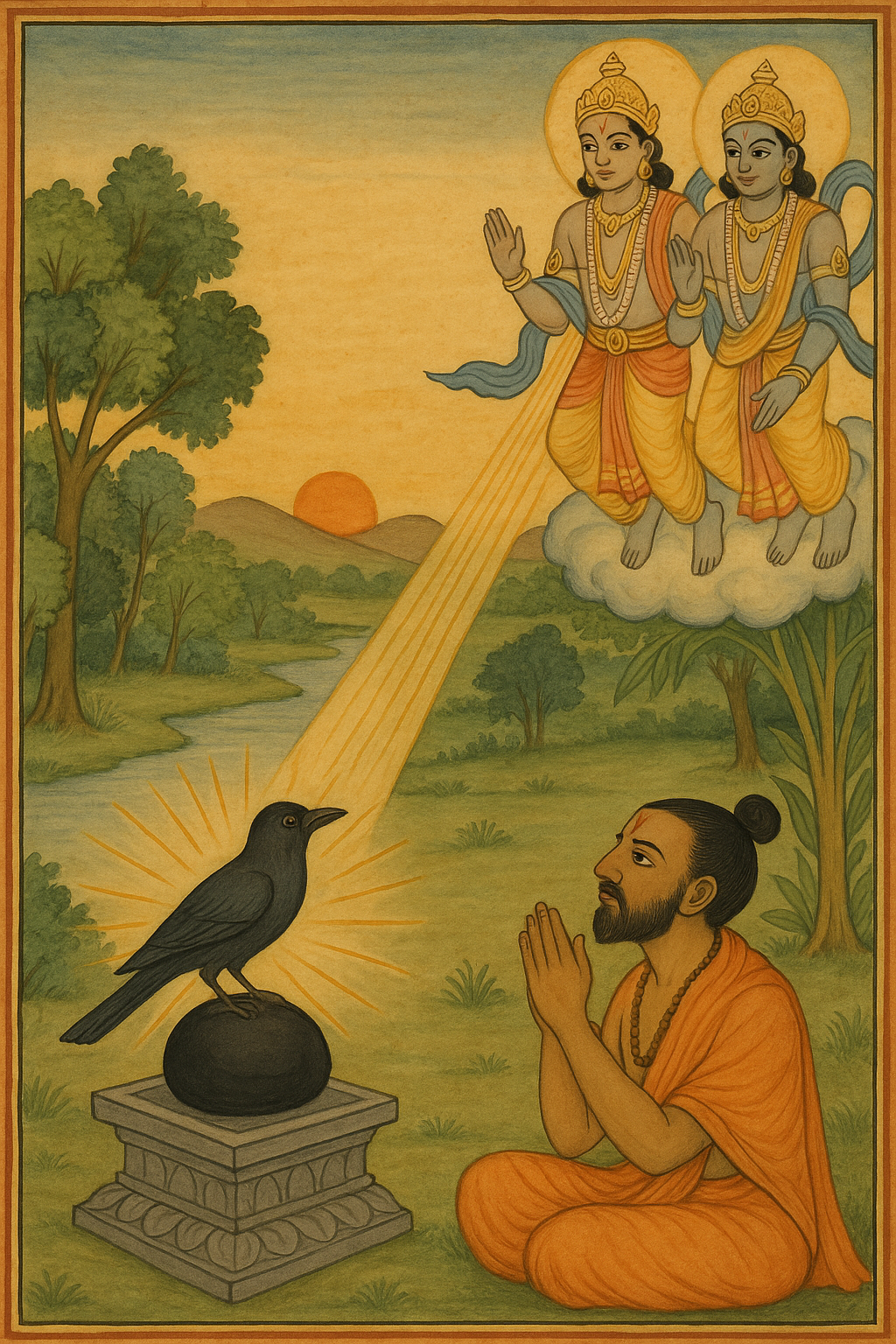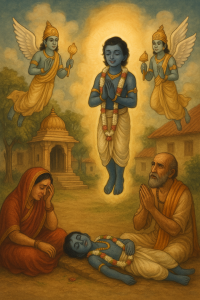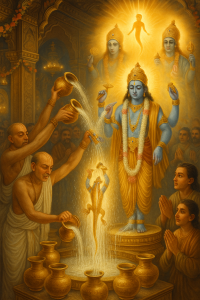The Brāhmaṇa’s Devotion
In a sacred village adorned with flowing rivers and tranquil groves, lived a highly respected brāhmaṇa. He was deeply devoted to Lord Viṣṇu and strictly followed the path of bhakti. His most treasured possession was a Śālagrāma-śilā—a sacred stone form of Lord Nārāyaṇa—personally received from his guru.
Each morning, well before dawn, the brāhmaṇa would bathe in the river, purify himself, and then begin his pūjā. With deep concentration, he bathed the Śālagrāma with cool water, offered fresh tulasī leaves and fragrant flowers, lit incense, and recited sacred mantras from the Vedas and Purāṇas. His worship was heartfelt, meticulous, and unwavering.
The Offering to the Sun
One morning, as part of his daily worship, he placed the Śālagrāma-śilā on a small altar outdoors to receive sūrya-snāna—the bathing of the Lord in the golden rays of the morning sun. Entrusting the Lord’s care to the gentle light, he walked to the river to fetch water for the final offering.
The Tired Crow’s Rest
At that very moment, a weary crow flew down, exhausted from a long journey. It landed softly upon the stone, unaware of its sacredness. The crow rested there for a few seconds, regaining strength, and then flew away, seeking food and water.
That very day, as fate would have it, the crow was struck by a hunter’s arrow and died.
The Arrival of the Viṣṇudūtas
But what happened next stunned the invisible witnesses of the universe.
At the time of death, the Viṣṇudūtas—divine messengers of Lord Viṣṇu—descended and gently lifted the soul of the crow. Smiling compassionately, they carried it toward the spiritual sky. The crow, though ignorant of devotion or dharma, was now bound for Vaikuṇṭha.
Questioned by the Celestials
As the Viṣṇudūtas passed through the higher realms, astonished celestial beings asked them:
“How has this crow, who lived a life driven by instinct and ignorance, been granted entry into the Lord’s abode?”
The Viṣṇudūtas replied with great gravity:
“This soul, though in the body of a crow, rested on a Śālagrāma-śilā—the direct and eternal form of Lord Nārāyaṇa. Even unknowing contact with the Lord brings liberation. Just as fire burns regardless of who touches it, so too does the divine presence sanctify, regardless of one’s awareness.”
The Brāhmaṇa’s Realization
News of this miraculous event spread throughout the village. When the brāhmaṇa heard it, tears welled up in his eyes. His heart overflowed with gratitude and wonder. Though he had always worshipped the Śālagrāma with reverence, now he realized the limitless potency and compassion of the Lord.
From that day on, his worship deepened. Each offering became sweeter, and each mantra more heartfelt. His home became a place of pilgrimage, where others came to understand the greatness of śraddhā (faith) and the power of divine contact.
Lessons to Be Learned
- The Śālagrāma-śilā is nondifferent from Lord Viṣṇu Himself.
Even unconscious or accidental contact with the Lord’s form brings liberation. - The Lord’s mercy is causeless and unconditional.
He lifts up even the lowliest creature, without judgment or expectation. - Spiritual objects like the Śālagrāma and Tulasī are potent and divine.
They are not symbols but living embodiments of the Lord’s grace. - No soul is too fallen to be touched by divine compassion.
The Supreme Lord sees beyond species, status, or merit—He sees the soul.
Origin of the Story: Padma Purāṇa


